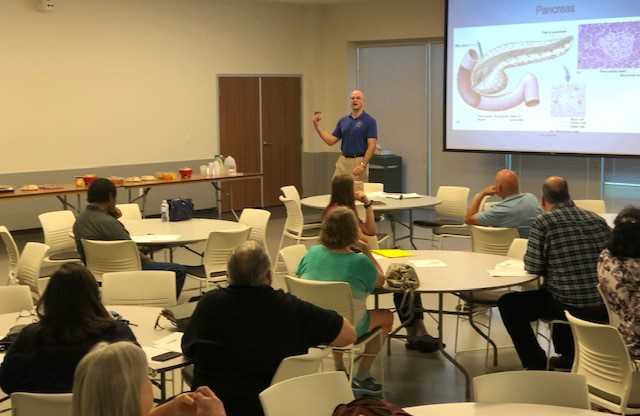Before outbreak of the novel coronavirus, a free educational program at the University of Houston-Victoria about chronic kidney disease was gaining momentum.
Twice monthly, a core group of participants was gathering to glean information from assistant professor Michael Wiblishauser and other experts, learn nutrition tips and get their blood pressure and blood glucose levels tested. Their interest encouraged Wiblishauser, who helped launch the Victoria Alliance Against Chronic Kidney Disease program in 2019. He wanted to help people get their diabetes and high blood pressure — conditions that lead to chronic kidney disease — under control.
Not only were the meetings informative, they also allowed the participants, many in their 60s, 70s and 80s, to get to know each other, and they looked forward to seeing each other. They got to know Wiblishauser, too.
“Some of the participants are isolated,” he says. “They built friendships. I developed a rapport with them.”
Now Wiblishauser sends weekly educational emails to group members in substitution of the face-to-face meetings. Additionally, Wiblishauser and other staff make monthly calls to everyone to maintain engagement, offer support and ensure they’re managing their conditions.
“That’s how we’ve gotten through this,” Wiblishauser says. “I get two or three emails, thanking me for the information I send them. I hope it helps everyone.”
Victoria’s kidney disease program is one of a dozen public health initiatives statewide still serving its community while keeping people safe during the pandemic. The programs receive grant funding through Healthy Kids, Healthy Families — BCBSTX’s signature community investments program to prevent and manage chronic kidney and chronic obstructive pulmonary disease, or COPD.
“Our long history of identifying and supporting strategic partnerships with organizations that have a shared interest in creating communities of healthy Texans has never been more important than it is now,” says Dr. Paul Hain, BCBSTX’s chief medical officer. “It’s important that we aid community-based organizations that are directly supporting children and families who have been impacted by the health, economic, and social implications of this pandemic.”
The insurer has taken applications for a new round of funding, and recipients soon will be announced.
As a result of the national health crisis, Wiblishauser’s program is adding a behavioral health expert to help participants manage anxiety and isolation and prevent further compromise their physical health. During the weekly calls, he and staff members noticed some program participants seemed to be struggling with loneliness and depression as they spent more time at home.
“We wanted to have someone on board who could look at the program from a different perspective,” says Wiblishauser, adding that isolation in older adults can create health problems. “We ask how they’re doing, find out what’s going on and ask about problems and whether they’re going to the doctor.”
About 11% of Texans have diabetes and 33% have high blood pressure. Statewide, diabetes and kidney disease are the seventh and eighth leading causes of death, respectively, according to the Centers for Disease Control and Prevention.
To improve outcomes, BCBSTX’s Healthy Kids, Healthy Families grants focus on disease prevention and management, nutrition, physical activity and safe environments. The 2021 grant cycle also will consider programs confronting health inequalities revealed by the pandemic, including lack of housing, food, education, employment and mental health availability.
Health coaching hotline
A hotline operated by the Austin-based health advocacy nonprofit It’s Time Texas has become the perfect solution for people who want health coaching without risking infection by the coronavirus.
Supported by a Healthy Kids, Healthy Families grant, the Living Healthier Coach hotline was launched a few years ago to offer Texans free professional coaching in English and Spanish to control conditions, including diabetes, chronic kidney disease and COPD. It supported clinical care by offering people an outlet to express their concerns and emotions – or ask questions they were too intimidated to pose to doctors.
“It’s not just a health coaching line,” says Andrea Rosario, Living Healthier’s program director. “We provide support folks here in Texas need to change their lives. We make sure our clients feel comfortable and stay on course with their goals.”
Since the pandemic, the hotline, as well as other online programs offered by It’s Time Texas, have become instrumental in helping people establish and maintain healthy habits as they spend more time at home. Behavioral health support, as well as online group coaching sessions and peer-to-peer support programs, have been introduced to keep participants connected, empowered and engaged.
“We want to help people feel less lonely and alleviate some of that isolation so we can strongly focus on their physical health,” Rosario says. “It’s a combination.”

